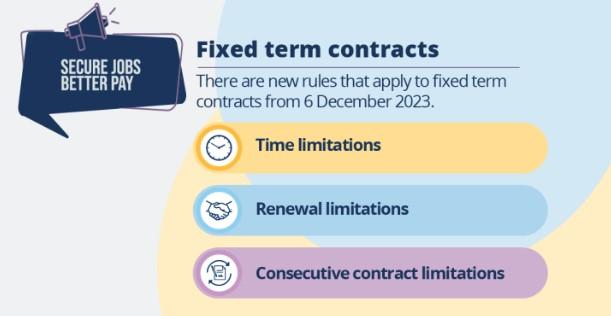New rules to fixed-term contracts
Do you need Workplace Relations support for your practice? Would you like to stay up to date with relevant legislation and awards? Would you like some help with workplace policies and procedures? Do you need assistance with a difficult conversation or poor performance? Contact the AMA Queensland Workplace Relations Team today on (07) 3872 2222 to find out how you could be receiving this kind of content regularly.

All credits to the image used goes to The Fairwork Ombudsmen.
From 6 December, new rules apply when engaging employees on fixed term contracts.
A fixed term contract is one which terminates at the end of a specific period. So, the contract will have a start date and a termination date. Eg An employee can be employed under a fixed term contract to cover a period of maternity leave or to work on a specific task which has an end date.
The new rules include:
- A requirement for employers to give any employees they are engaging on a new fixed term contract a Fixed Term Contract Information Statement (FTCIS) (as attached).
- Limitations on how fixed term contracts can be used.
From 6 December 2023, employers must give employees they are engaging on a new fixed term contract a Fixed Term Contract Information Statement. This must be provided to employees before they start employment. In addition to this, employers also need to provide employees with the Fair Work Information Statement. This is a separate document that provides information about minimum workplace rights and entitlements.
From 6 December 2023, there are limitations about using fixed term contracts after this date. There are 3 rules and all of them need to be followed. These limitations relate to:
- How long a fixed term contract can be (time limitation).
- Renewing a fixed term contract, including how many times a contract can be renewed (renewal limitations).
- Employing a person on consecutive contracts (consecutive contract limitations)
A fixed term contract cannot be for longer than 2 years, including extensions and renewals.
A fixed term contract cannot have an option to:
- Extend or renew the contract so that employment period (including the extension of renewal period) is longer than 2 years, or
- Extend or renew the contract more than once.
An employer cannot employe someone on a new fixed term contract if;
- The contract is for mainly the same work as a previous fixed term contract,
- There is not a substantial break in the employment relationship between the previous and new contracts, and
- any of the following apply:
- the total period of employment for the previous contract and the new fixed term contract is more than 2 years, or
- the new fixed term contract can be renewed or extended, or
- there was an initial fixed term contract in place (before the previous contract) that,
- was mainly the same work, and
- there was continuity of the employment relationship from the period of time (if any) between the initial contract and the previous contract.
For fixed term contracts entered into before 6 December 2023, the limitations don’t apply, however that contract will need to be considered when applying the consecutive contracts limitation for a new fixed term contract that is entered into on or after 6 December 2023.
If you need any Further guidance regarding Fixed-Term contracts, please contact the AMA Queensland Workplace Relations Team on 3372 2264 or email on workplacerelations@amaq.com.au
We are here to help.
To learn more visit this Fair Work Ombudsman’s webpage.
Download the Fixed-Term Contract Information Statement.
|
Workplace Relations Support can help you with any questions you may have with what to pay your staff on public holidays coming up in the future. You can contact us via phone (07) 3872 2222 and email support workplacerelations@amaq.com.au. |
|
|
Workplace Relations Toolkit Workplace Relations Toolkit provides its subscribers with up to date information about entitlements in regards to pay rate increases and public holiday payments for your practice. It also comes with a range of policy templates, in particular, leave policies, which will assist with dealing with bulk leave applications during these holiday periods. |
|
|
Workplace Relations Consultancy Workplace Relations Consultancy can review your current processes with regards to staff payments or perform back payment calculations where staff may have been paid incorrectly in the past. |